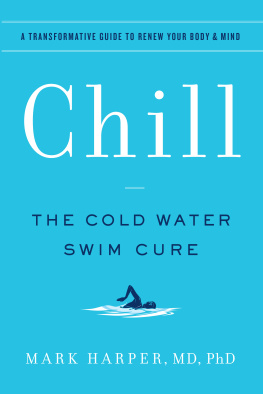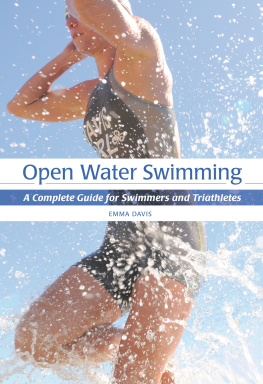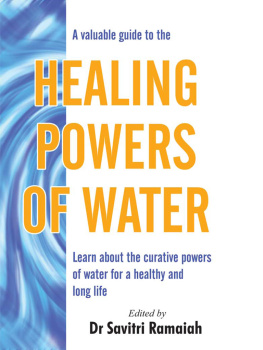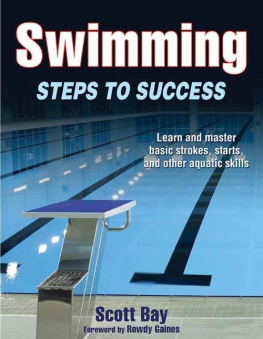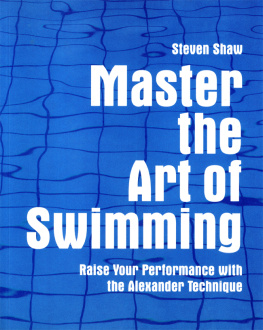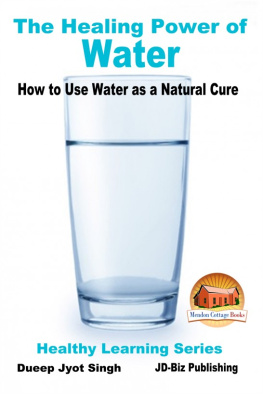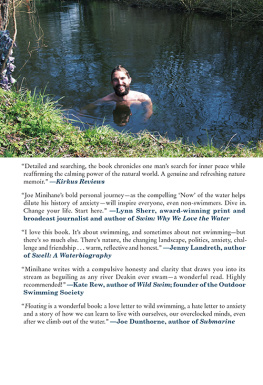

Copyright 2022 by Mark Harper.
All rights reserved. No part of this book may be reproduced in any form without written permission from the publisher.
Library of Congress Cataloging-in-Publication Data
Names: Harper, Mark (Anaesthetist), author.
Title: Chill : the cold water swim cure / Mark Harper, MD, PHD.
Description: 1st. | San Francisco : Chronicle Prism, [2022] | A
transformative guide to renew your body and mindCover. | Includes
bibliographical references. |
Identifiers: LCCN 2022004208 (print) | LCCN 2022004209 (ebook) | ISBN
9781797213767 (paperback) | ISBN 9781797213781 (ebook)
Subjects: LCSH: SwimmingTherapeutic use. | SwimmingPhysiological
aspects.
Classification: LCC RC1220.S8 H37 2022 (print) | LCC RC1220.S8 (ebook) |
DDC 613.7/16dc23/eng/20220217
LC record available at https://lccn.loc.gov/2022004208
LC ebook record available at https://lccn.loc.gov/2022004209
Design by Brooke Johnson. Typesetting by Maureen Forys, Happenstance Type-O-Rama. Typeset in Atlantik, Filosofia, Gotham, Knockout, Karmina, and Sackers Gothic.
This book contains advice and information relating to health and interpersonal well-being. It is not intended to replace medical or psychotherapeutic advice and should be used to supplement rather than replace any needed care by your doctor or mental health professional. While all efforts have been made to ensure accuracy of the information contained in this book as of date of publication, the publisher and the author are not responsible for any adverse effects or consequences that may occur as a result of applying the methods suggested in this book.
Chronicle books and gifts are available at special quantity discounts to corporations, professional associations, literacy programs, and other organizations. For details and discount information, please contact our premiums department at corporatesales@chroniclebooks.com or at 1-800-759-0190.
Chronicle Prism is an imprint of Chronicle Books LLC, 680 Second Street, San Francisco, California 94107
www.chronicleprism.com
Contents
Authors Note
In 1760, more than two centuries before I first dipped my toes in the frigid waters off Brighton, Dr. Richard Russell, a renowned physician, published his famous Dissertation on the use of sea water in the diseases of the glands: Particularly the scurvy, jaundice, Kings-evil, leprosy, and the glandular consumption.
As part of his prescription, Dr. Russell recommended patients regularly swim in the ocean and, postswim, drink pints of seawater mixed with an oxymel of squills, an effective purgative.
While most of Dr. Russells claims may be somewhat overambitiousand, admittedly, rather unpalatableI have no doubt he observed in his research and his treatment regimens real positive effects.
I have witnessed similar effects.
Since Dr. Russells prime, our knowledge of physiology has advanced considerably. We can now explain, for instance, his observations about swimming in open water, particularly in water below 68F, or 20C. We also know more about what happens to the body when it is exposed to cold water, how the body adapts to the stress of cold water over time, and how regular cold water swimming can help people cope with the ill effects of modern lifefrom chronic pain and osteoarthritis to migraines, depression, and anxiety.
Of course, I dont suggest that sea bathing has all the benefits Dr. Russell described. Nor do I recommend following his radical regime of bloodletting and ingesting seawater alongside a tincture of ipecacuanha (an emetic), carduus water, squill, spodium, raw egg yolk with the fome of the white, cinnamon, and sugar candy. To be honest, I cant promise that cold water swimming is a definitive cure for any particular symptom or ailment, no matter how many hours someone logs in the water. Unlike Dr. Russell, I do not believe swimming in cold water alone is some kind of universal cure.
That said, scientific evidence and first-person accounts show that cold water swimming is an effective therapeutic when practiced with other forms of medical interventions and consistent changes in lifestyle habits for which it may be the catalyst.
I provide that evidence and those stories in the following pages, which clearly demonstrate the very real, life-changing health effects of regular dips in temperate to frigid waters. The reason for this is that cold water swimming combines a number of the best and most effective aspects of preventative medicine and, more importantly, healthy living. Cold water swimming results in immediateand sustainableimprovements in overall health and general well-being across three essential categories: reorientation, transformation, and connection.
Cold water swimmers report an overall improvement in both their physical and mental health. This includes reductions in blood pressure, inflammation, and chronic pain levels, as well as weight loss, better sleep, and a more engaged and optimistic outlook. There are additional knock-on benefits that include greater resilience and a more substantial place within the community, which reduces social isolation and provides a shared sense of caring and belonging. Cold water swimming enhances personal autonomy, encourages personal achievement, and is an opportunity to spend time outdoors, which in itself improves our overall well-being.
Plus, importantly, its fun. All of this provides a significant boost to our system and lets us reboot our body and mind, which is the first step to feeling revitalized and refreshed and consequently enjoying a healthier and more satisfying life.
I have divided the book into three parts. In part I, The Transformative Power of Water, I explain in everyday language how cold water swimming improves general well-beingincluding the science of cold water immersion and cold water adaptation. In part II, The Cold Water Swim Protocol, I provide advice for cold water swimming itself. This includes making a plan, finding companions, and having the proper kit, but most of all, how to do it: getting in and getting out, getting wet and getting blessedly dry and warm. In part III, The Cold Water Swim Cure, I provide inspiring first-person accounts of how a consistent cold water swimming practice has improved the symptoms of a range of mental and physical illnesses, such as depression and trauma, chronic pain, migraines, fibromyalgia, and autoimmune diseases.
Now, if youre ready to take the plunge, lets dive in.
Part I
The Transformative Power of Water
Chapter 1
Thats Funny
My Cold Water Epiphanies
Ive always swum.
For several summers as a young man, I worked as a lifeguard on the beaches of Brighton. Fortunately, the swimmers I was charged with protecting rarely got into real difficulty. In fact, I never once had to venture into the surf, largely because back in the 1980s neither I nor many of my fellow countrymen and -women seemed to have any inclination to set foot in the cold water.
Next page
